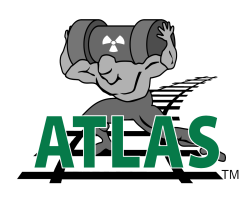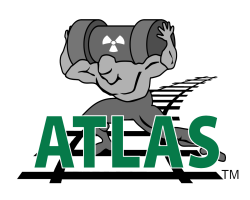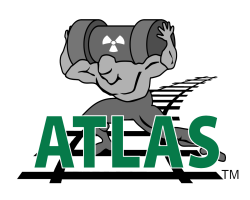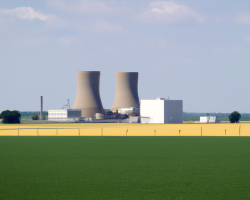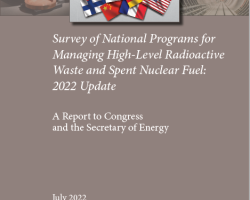Category of Content
Siting Experience Documents Only
Publication Date
Subject Matter
Keywords
Task Order 17 – Cask Design Study Final Report
Task Order 17 – Cask Design Study Final Report
Incorporating Uncertainty in RADTRAN 6.0 Input Files
Incorporating Uncertainty in RADTRAN 6.0 Input Files
ATLAS Railcar Design Project Status Report
ATLAS Railcar Design Project Status Report
DOE Atlas Railcar Project End-of-Phase 2 Final Report
DOE Atlas Railcar Project End-of-Phase 2 Final Report
Atlas Phase 2 Final Report Appendix A
Atlas Phase 2 Final Report Appendix A
This document provides a white paper detailing required changes to the DOE Atlas railcar conceptual cradle attachment components and Phase 1 conceptual cradle design due to the addition of the HI-STAR 190 SL and XL casks to the project.
Atlas Phase 3 Report - Prototype Fabrication and Delivery
Atlas Phase 3 Report - Prototype Fabrication and Delivery
The United States Department of Energy (DOE) is preparing for future large-scale transport of spent
nuclear fuel and high-level radioactive waste, which are collectively defined as High-Level Radioactive
Material (HLRM) by the Association of American Railroads (AAR). A part of this preparation includes
designing railcars to be used for the transport of HLRM.
Atlas Phase 2 Report - Preliminary Design
Atlas Phase 2 Report - Preliminary Design
The United States Department of Energy (DOE) is preparing for future large-scale transport of spent nuclear fuel and high-level radioactive waste, which are collectively defined as High-Level Radioactive Material (HLRM) by the Association of American Railroads (AAR). A part of this preparation includes designing railcars to be used for the transport of HLRM.
Socio-technical multi-criteria evaluation of long-term spent nuclear fuel management strategies: A framework and method
Socio-technical multi-criteria evaluation of long-term spent nuclear fuel management strategies: A framework and method
In the absence of a federal geologic repository or consolidated, interim storage in the United States, commercial spent fuel will remain stranded at some 75 sites across the country. Currently, these include 18 “orphaned sites” where spent fuel has been left at decommissioned reactor sites.
Shared Yet Contested: Energy Democracy Counter-Narratives
Shared Yet Contested: Energy Democracy Counter-Narratives
Conventional ways of communicating about the transition to renewable energy in North America presuppose that energy systems can be changed while sustaining existing social, political, and economic relations. Energy democracy counters such ostensibly apolitical narratives by emphasizing the socially transformative potential of this transition. Yet energy democracy, as both organizing principle and social movement, is itself increasingly recognized as flexible and contested.
Public controversies and the Pragmatics of Protest: Toward a Ballistics of collective action
Public controversies and the Pragmatics of Protest: Toward a Ballistics of collective action
By using long run case studies and comparative analysis, I will address different processes by which alerts and criticisms are taken seriously by different actors and lead them to transform or to defend devices, norms and institutions. To deal with this kind of process, I will present an analytical model which runs on the recent controversies about radioactivity, GMOs and nanotechnologies. For many years, these fields have been marked by struggles in which scientific arguments are seldom dominant but are nevertheless relevant.
Energy Democracies and Publics in the Making: A Relational Agenda for Research and Practice
Energy Democracies and Publics in the Making: A Relational Agenda for Research and Practice
Mainstream approaches to energy democracy and public engagement with energy transitions tend to adopt specific, pre-given meanings of both “democracy” and “publics.” Different approaches impose prescriptive assumptions about the model of participation, the identity of public participants, and what it means to participate well.
Citizens, amateurs, volunteers: Conceptual struggles in studies of citizen science
Citizens, amateurs, volunteers: Conceptual struggles in studies of citizen science
The goal of this literature review is to bring together the different concepts, respective definitions and perspectives that have been used to study the participation of non-professionals in scientific activities. We start by presenting a short definition of citizen science and the perceived benefits of such approaches to the production of scientific knowledge. We then clarify the difference between today’s citizen science projects and their ancestors in the field sciences by highlighting technological and social changes.
Embedding Environmental Justice into the Washington State Department of Ecology: Promising Practices for Advancing Equity and Environmental Justice
Embedding Environmental Justice into the Washington State Department of Ecology: Promising Practices for Advancing Equity and Environmental Justice
The purpose of this report is to equip the Washington State Department of Ecology (Ecology) with evidence-based recommendations to further equity and environmental justice (EJ) efforts within their capacity as the state’s environmental regulatory agency, in service of advancing EJ for those who live, work, and play in Washington. This report is intended to share promising trends and tools, acknowledge common barriers and ideas for overcoming those barriers, elevate successes, and amplify equitable practices for defining, measuring, mobilizing, and sustaining meaningful EJ work.
Free Prior and Informed Consent: An indigenous peoples’ right and a good practice for local communities
Free Prior and Informed Consent: An indigenous peoples’ right and a good practice for local communities
This Free, Prior and Informed Consent (FPIC) Manual is designed as a tool for project practitioners (herein referred as project managers) for a broad range of projects and programmes (hereinafter to be referred to as projects) of any development organization, by providing information about the right to FPIC and how it can be implemented in six steps.
How the Concept of Dignity Is Relevant to the Study of Energy Poverty and Energy Justice
How the Concept of Dignity Is Relevant to the Study of Energy Poverty and Energy Justice
Since the concept of energy poverty first emerged, studies have combined normative orientations, analytical approaches and policy review to engage with energy deprivation as a problematic feature of contemporary societies. Over the past decade, this scholarship has aimed to conceptualize the normative grounds for critique, empirical work and policy design when engaging with the interplay of social life and energy systems.
Expanding the Conceptual and Analytical Basis of Energy Justice: Beyond the Three-Tenet Framework
Expanding the Conceptual and Analytical Basis of Energy Justice: Beyond the Three-Tenet Framework
Energy justice is now an established research topic in the field of energy policy. Despite the growing popularity of energy justice research, however, conceptual and analytical frameworks used in the field have remained limited. This paper reviews the prevailing three-tenet framework of energy justice which has shaped the current discourse based on the three dimensions—distributional, procedural, and recognition justice.
Interim Storage, Environmental Justice, and Generational Equity
Interim Storage, Environmental Justice, and Generational Equity
With the termination of the Yucca Mountain project, which was proposed to be our nation’s first repository for the disposal of military and civilian spent nuclear fuel and high-level radioactive waste, the future of nuclear waste management and disposal in this country became increasingly uncertain. Interim storage has been advocated by many as a temporary solution while a permanent solution is studied for potentially several more decades to come.
Transportation Planning: Indigenous Dialogue
Transportation Planning: Indigenous Dialogue
In 2019, the NWMO commissioned Maawandoon Inc to lead Indigenous Dialogue session to support NWMO’s transportation planning for the long-term care of Canada’s used nuclear fuel. This research built upon and complemented public attitude research carried out in 2017 and 2018. The research methodology consisted of 7 Indigenous dialogue sessions and attendance at 3 Indigenous Annual General Assemblies (AGA)/meetings with dialogue components.
Views and Attitudes toward Nuclear Waste: National Survey Final Report
Views and Attitudes toward Nuclear Waste: National Survey Final Report
In 2002, the federal government passed a law to create the Nuclear Waste Management Organization, also known by its initials NWMO. The Nuclear Waste Management Organization (NWMO) was established by Ontario Power Generation Inc., Hydro-Québec and New Brunswick Power Corporation in accordance with the Nuclear Fuel Waste Act (NFWA) to assume responsibility for the long-term management of Canada’s used nuclear fuel. More specifically, the NWMO’s initial objective was to recommend a long-term approach for managing used nuclear fuel produced by Canada’s electricity generators.
COMMUNITY GUIDE TO ENVIRONMENTAL JUSTICE AND NEPA METHODS: PRODUCT OF THE FEDERAL INTERAGENCY WORKING GROUP ON ENVIRONMENTAL JUSTICE & NEPA COMMITTEE
COMMUNITY GUIDE TO ENVIRONMENTAL JUSTICE AND NEPA METHODS: PRODUCT OF THE FEDERAL INTERAGENCY WORKING GROUP ON ENVIRONMENTAL JUSTICE & NEPA COMMITTEE
The Community Guide to Environmental Justice and NEPA Methods provides information for communities who want to assure that their environmental justice (EJ) issues are adequately considered when there is a Federal agency action that may involve environmental impacts on minority populations, low-income populations, and/or Indian tribes and indigenous communities. Such Federal actions include:
Communicating Risks and Benefits: An Evidence-Based User's Guide
Communicating Risks and Benefits: An Evidence-Based User's Guide
Effective risk communication is essential to the well-being of any organization and those people who depend on it. Ineffective communication can cost lives, money, and reputations. Communicating Risks and Benefits: An Evidence-Based User's Guide provides the scientific foundations for effective communication.
National Environmental Justice Advisory Council: 20-Year Retrospective Report (1994-2014)
National Environmental Justice Advisory Council: 20-Year Retrospective Report (1994-2014)
This report documents the work of one of the most successful Federal advisory committees in the history of the U.S. Environmental Protection Agency (EPA). The National Environmental Justice Advisory Council (NEJAC) was established by EPA on September 30, 1993 to provide independent advice to the EPA Administrator on broad, cross-cutting issues related to environmental justice.
Science based responses to social myths on nuclear energy
Science based responses to social myths on nuclear energy
In order to promote a sound basis for considering the role of nuclear in climate change, this review spans the technical topics of social and political debate surrounding nuclear energy with a focus on the objective science of these issues including nuclear waste, accidents and overall risk. Novel aspects include the emergence of nuclear energy as being potentially renewable and the antithesis of Fukushima being an argument for the unacceptable risks associated with the use of nuclear energy.
Survey of National Programs for Managing High-Level Radioactive Waste and Spent Nuclear Fuel: 2022 Update
Survey of National Programs for Managing High-Level Radioactive Waste and Spent Nuclear Fuel: 2022 Update
In October 2009, the U.S. Nuclear Waste Technical Review Board (Board or NWTRB) published Survey of National Programs for Managing High-Level Radioactive Waste and Spent Nuclear Fuel. For each of the 13 national programs studied, the report catalogued 15 institutional arrangements that had been set in place and 15 technical approaches that had been taken to design repository systems for the long-term management of high-activity radioactive waste.
